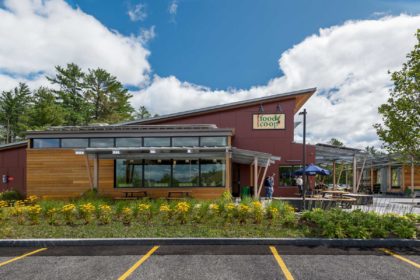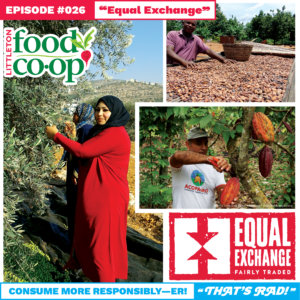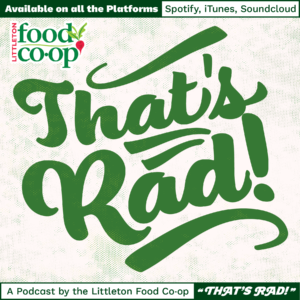
Anastasia Maher (she/her), Marketing Assistant, Littleton Food Co-op, amaher@littletoncoop.org
 October is National Co-op Month and Fair Trade Month, both of which are discussed on the latest episode of Littleton Food Co-op’s podcast, That’s Rad. The featured October episode (Episode XVI: Equal Exchange) includes host Anastasia, Littleton Food Co-op Marketing Assistant, and Danielle Robidoux, Organizer at Equal Exchange. Robidoux is also a leader of the new Citizen-Consumer Initiative at Equal Exchange.
October is National Co-op Month and Fair Trade Month, both of which are discussed on the latest episode of Littleton Food Co-op’s podcast, That’s Rad. The featured October episode (Episode XVI: Equal Exchange) includes host Anastasia, Littleton Food Co-op Marketing Assistant, and Danielle Robidoux, Organizer at Equal Exchange. Robidoux is also a leader of the new Citizen-Consumer Initiative at Equal Exchange.
The episode starts with the two cooperators establishing a framework for understanding fair trade as it is today. Equal Exchange is considered a pioneer in the fair trade movement, having imported the first fairly-traded coffee from Nicaragua in 1986 during a US embargo. More organizations have joined since, and consumers will see an assortment of “fair trade” certifications on common items in the grocery store. This may be why it’s shocking to see Equal Exchange proclaim “our mission is more threatened today than it was 10 years ago” so boldly on its website. To Robidoux, this can be attributed to acquisitions of smaller brands focused on fair trade by larger companies that are not. “The bigger companies are benefiting from the positive value that that brand is associated with, keeping that outward facing brand [that] seems as though it’s independent, but really it’s owned by this large company”, she says. “When you walk through a store as a consumer you look around and you would have this thought ‘wow, there are so many choices’ […] and then the reality is that you have three companies that own 90% of the beverages we buy in a supermarket…so is that choice or is that the illusion of choice?”
 The pair also discusses the cooperative structure of Equal Exchange. Members of the Littleton Food Co-op and other consumer cooperatives will have their own understanding of what it means to be a member of a co-op: member-only discounts, voting in elections, and patronage rebates. On the other hand, Equal Exchange is a worker cooperative. Its members are the farmers they work with, all of whom invest equal shares in the business. Organizing as a democratically run system helps keep all players invested in their success. For Robidoux “this isn’t about poverty alleviation and charity work; this is about economic liberation and connecting people to a market…To me what’s really fair is let’s sit around the same table [as the farmers], let’s talk about what’s fair.” Members of Equal Exchange vote on matters such as creating sub-committees, location changes, and new product production.
The pair also discusses the cooperative structure of Equal Exchange. Members of the Littleton Food Co-op and other consumer cooperatives will have their own understanding of what it means to be a member of a co-op: member-only discounts, voting in elections, and patronage rebates. On the other hand, Equal Exchange is a worker cooperative. Its members are the farmers they work with, all of whom invest equal shares in the business. Organizing as a democratically run system helps keep all players invested in their success. For Robidoux “this isn’t about poverty alleviation and charity work; this is about economic liberation and connecting people to a market…To me what’s really fair is let’s sit around the same table [as the farmers], let’s talk about what’s fair.” Members of Equal Exchange vote on matters such as creating sub-committees, location changes, and new product production.
The episode concludes with a discussion on the role that individuals can (and should) have in creating an equitable food system. Aside from being a distributor and retailer of fair trade products, the foundation of Equal Exchange also includes education and activism. One suggested idea for individuals is joining the Citizen-Consumer Community, headed by Robidoux. “We really just believe that in order to survive, consumers need to understand their food, where it;’s coming from, they need to be involved more with organizations like Equal Exchange who are trying to make positive change in the food system,” she says. “And so we wanted to open up our governance model to consumers so they could share that responsibility with us in a really meaningful way.” A barrier to US consumers participating in the fair trade economy is often the thing keeping the farmers and producers in it— that “fair trade premium.” “I think when people get stressed about how far their dollar is going, it’s very hard to think beyond your immediate need,” says Maher. “[Inflation] is making people question their decision [to buy] fair trade products more.” This idea is discussed, as well as no-cost options that make food justice accessible to all.
 Episode XVI: Equal Exchange can be listened to on any podcast streaming platform by searching “Littleton Food Co-op.” Current hosting sites include Spotify, Apple Podcasts, Soundcloud, and Google Podcasts.
Episode XVI: Equal Exchange can be listened to on any podcast streaming platform by searching “Littleton Food Co-op.” Current hosting sites include Spotify, Apple Podcasts, Soundcloud, and Google Podcasts.
The Littleton Food Co-op is Littleton, NH’s only community-owned marketplace, and your premier destination for all fairly sourced products. Browsing the aisles you’ll find local organic produce, fine cheeses, meats, bulk foods, craft beers, and more. Plus, look for the new orange “Inclusive Trade” shelf tags to indicate which products have been certified in offering fair wages and labor practices for their producers. Co-op membership is another great way to make changes in your food system, but no membership is required to shop at the Co-op. All are welcome! Stop by in-store any day of the week to learn more about membership and see all the store has to offer. Or visit us online at littletoncoop.com, Instagram, and Facebook.
For more information on Equal Exchange visit https://shop.equalexchange.coop/.



